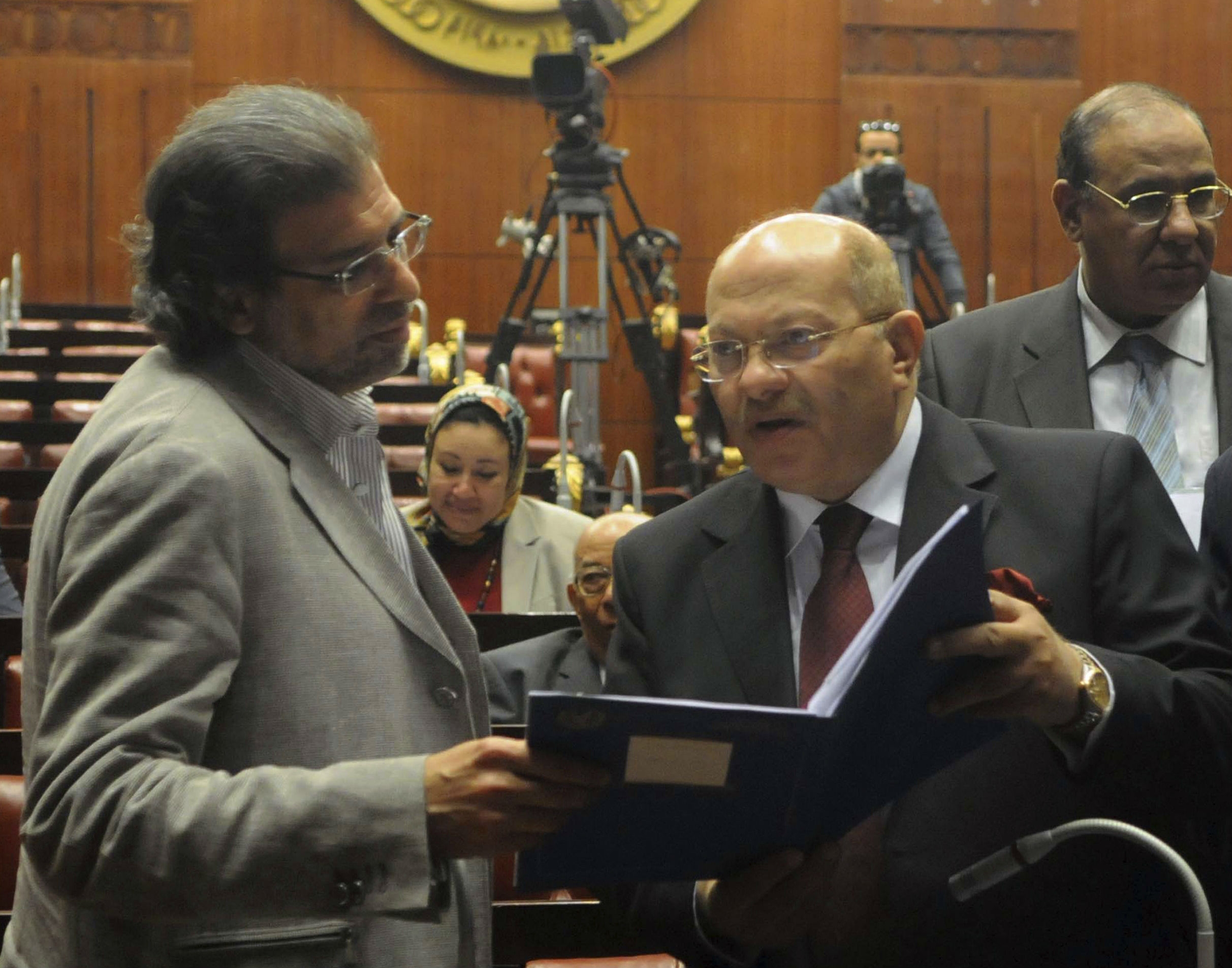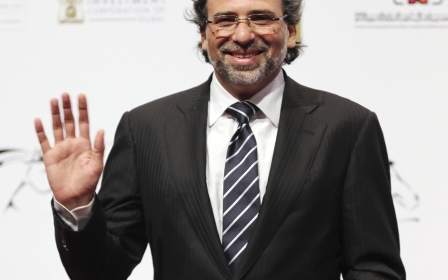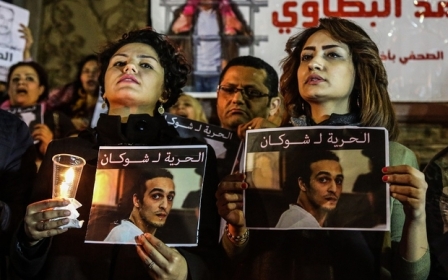Egyptian MP Khaled Youssef may face prosecution over leaked sex videos

Egyptian MP and filmmaker Khaled Youssef is in danger of having his membership of parliament cancelled as a lawsuit seeks to strip him of his parliamentary immunity from prosecution.
On Monday, the Egyptian administrative judiciary court set 16 March as the date for the first hearing into a case filed by pro-government lawyer Samir Sabry earlier this month.
In the suit, Sabry requests parliament’s ethics committee lifts Youssef’s immunity, citing “his loss of good reputation" over leaked sex videos allegedly shot by the parliamentarian.
Youssef has accused the country's authorities of publicising the video, which he is alleged to have filmed with two women actors, as an act of revenge in response to his opposition to proposed changes to the constitution.
Youssef, a member of the small opposition bloc in parliament, has spoken out against the changes, which could enable President Abdel Fattah el-Sisi to remain in power until 2034.
The video was picked up and reported on by state-owned newspapers last month, just days after he had said he was opposed to lifting the presidency's two-term constitutional limit.
How would Egypt’s constitution change?
+ Show - HideMeasures proposed under the new constitution include:
- Extending the presidential term from four to six years. A separate provision would let the current president to run for office at the end of his current term
- Expanding the role of the armed forces to include “safeguarding the constitution and democracy, maintaining the foundations of the state and its civilian nature, the gains of the people, and the rights and freedoms of the individual”.
- Allowing the president to appoint the prosecutor general, the head of the supreme constitutional court and its new members, also to chair a supreme council for judicial bodies
- Creating a second parliamentary chamber, with one-third of members appointed by the president
- Allocating at least one quarter of the parliamentary seats for women
- Increasing the allocation of parliamentary seats for Coptic Christian candidates.
- Creating the post of vice-president to assist the president and to serve as temporary president with limited powers if the president cannot carry out his duties
Youssef, who is currently in France for a family visit, may face prosecution if his parliamentary immunity is lifted.
If convicted, Youssef could face a minimum of two years in jail, according to Egyptian law that criminalises “prostitution and incitement to immorality” including by “electronic communication”.
Egyptian public prosecutor Nabil Sadeq has imposed a gag order on Youssef’s case after the two women apparently in the video were arrested.
The two women were arrested last week on charges of engaging in “scandalous acts”, and were filmed by pro-government media announcing they were both legally married to Youssef and that he was the third person in the video, who is not identifiable in the footage.
It is unclear whether Youssef would return to Egypt, but he told al-Hurra channel last week that he would return once official charges are brought against him.
“I am still a member of parliament and I have immunity [from prosecution],” he said.
“No one has formally demanded lifting my immunity, and my name has not been added to any watch list in airports.”
A familiar pattern
Ahmed Naji, an Egyptian writer who was jailed for 10 months for “violating public modesty” over "explicit sexual content" in one of his novels, said the case against Youssef was part of a “message of intimidation and warning” against him by the state.
“The policy of exposing the private lives of citizens is part of a pattern used by Egyptian security services since President Gamal Abdel-Nasser as a blackmailing tool against dissidents,” he told Middle East Eye.
Youssef was a supporter of the January 2011 revolution against longtime autocrat Hosni Mubarak's rule, and had previously been critical of the Egyptian authorities in his 2007 movie, This is Chaos, a story of Egyptian police brutality.
But he was also an opponent of the Muslim Brotherhood and was one of the icons of the 2013 protests calling for Morsi to quit.
On 30 June 2013, Youssef was granted exclusive use of a military helicopter to film bird’s eye footage of the protests against Morsi’s rule.
'The policy of exposing the private lives of citizens is part of a pattern used by Egyptian security services since President Gamal Abdel-Nasser'
- Ahmed Nagy, writer
He supported the coup that brought Sisi to power and also his government's crackdown on opposition protests which included the killing of over 1,000 protesters.
However, since winning a parliamentary seat as an independent in 2015 elections, he has aligned himself with the opposition 25-30 Alliance bloc in parliament.
In social media posts a day before the appearance of the video on social media, Youssef explained his reasons for opposing changes to the constitution which have been widely reported as a move to allow Sisi to remain in power.
“The Egyptian people did not revolt twice to nationalise all powers and put them in one man’s hand - no matter how great that man is - or to give him the right to rule until 2034, ie. for 20 years,” Youssef wrote in a Facebook post.
“The bigger catastrophe is that whoever will rule after [Sisi] will have all powers in his hands, according to the constitution,” he added.
He also condemned proposed amendments that give broader powers to the executive branch of government over the judiciary.
Naji said the sheer number of Egyptian media articles on sexual leaks last week point to "a policy of distracting public opinion by creating pointless debates on taboo issues".
Youssef, however, had predicted the backlash prior to the leaks, although he later told BBC Arabic that he did not regret supporting Sisi.
“I know that my continued objection to the constitutional amendments will bring me troubles, possibly to the extent of jail on trumped-up charges, but I’ve said before that I am willing to pay the price and face repercussions, no matter how harsh they may be.
"They [authorities] believe that those opposing the amendments must face intimidation to be silenced,” he wrote on Facebook.
Middle East Eye delivers independent and unrivalled coverage and analysis of the Middle East, North Africa and beyond. To learn more about republishing this content and the associated fees, please fill out this form. More about MEE can be found here.




